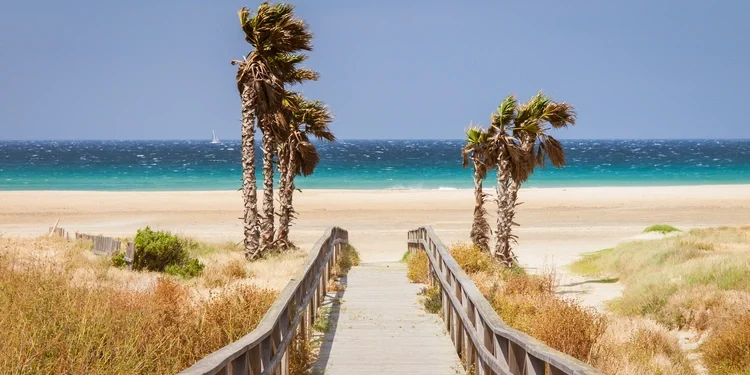Along Spain’s southwestern coast is an area you’ve probably never heard of…
It’s called the Costa de la Luz, or the Coast of Light, and going from northwest to southeast, it stretches from Spain’s border with Portugal down to Tarifa, the southernmost point in Europe, almost touching Morocco across the Strait of Gibraltar, along the Atlantic Coast.
This region is famous for the very thing it’s named for: dazzling, abundant sunshine. At well over 3,000 sunshine hours per year, vitamin D deficiency is not a risk here.
The Costa de la Luz’s centerpiece is Cádiz. It’s often called “Little Havana” or compared to Old San Juan, Puerto Rico, because of its long board-walked beachfront backed by colorful ancient buildings…
In fact, Cádiz is the prototype that those New World cities were based on. It’s touted as the oldest city in Western Europe, dating to 1104 BC.
Walking its streets, you can feel the history and see the cultural influence of the many civilizations—from Phoenicians to the Romans to the Moors—that impacted it over time.
Its Old Town is densely populated, with one of Europe’s oldest neighborhoods and ruins hemmed in by old city walls. Individual landmarks syncretize various architectural styles. Narrow streets spill out into lively plazas where you can sit in the shade of a towering cathedral and watch the world go by…
But there’s more to the Costa de la Luz than just Cádiz…
Cádiz Province (one of the two provinces that the Costa de la Luz covers; the other is Huelva) offers everything from well-appointed beachfront towns to ancient hilltop villages that can be seen for miles because of their brilliant white-washed buildings.
Across these towns, you find pockets of expats that love the region for its low cost of living, beautiful beaches, pristine nature, and authentic culture.
The Costa de la Luz is not the most popular destination in Spain for expats… but its authenticity and low-key local vibe is part of its appeal. That said, in certain towns around the region, you’ll find some decent-sized expat communities that you can join, if you want to…
Cádiz, despite being the biggest city on this coast, is not home to a huge number of expats. I’d estimate that no more than a dozen or so call the Old Town home, and some of them are only here on a seasonal basis.
About 28 miles north of Cádiz is Rota, the town that’s famous for the Rota naval base, which is shared by Spanish and U.S. forces. It hosts U.S. Marine Corps and U.S. Air Force units, so there is a big American presence in this town of 29,000.
One expat, Stephanie, settled in Rota precisely for this reason…
“We moved here in 2020. Because my husband is retired from the military, we can use the facilities, most importantly the Space A flights for military
personnel, but also the fitness center and other recreational facilities, the hospital, and the library (which I realized is really valuable because it’s also a place to print and scan documents).
“I love the beauty of Rota’s coastline. I never get tired of seeing the ocean. I can run along the beach for miles or walk through the pine forest on the dunes overlooking the Bay of Cádiz. I love that life is so much more affordable, and that fresh fruits, vegetables, and fish are a bargain.
“It’s so easy to make plans to do something outside because the weather is rarely bad. We can eat outside year-round.”
“I also enjoy the calmness and simplicity of life in Rota and the relative safety… that was an interesting thing. We had a checklist for our ideal overseas destination, and while we wouldn’t consider locations that we knew were ‘unsafe,’ safety wasn’t one of the specific items on our list. We hadn’t realized how important it was until we lived in Japan.
“I’ve come to learn that safety is freedom. Japan was extremely safe… and for the most part, I feel comfortable in Rota. People stay out so late here, so there are always people on the streets, and I never feel unsafe at night.”
Aside from the naval base, Rota offers ancient history, fine beaches, a walkable town center, and proximity to golf and natural attractions, including the Camino
Natural—a wooden pathway that runs through a pine forest and along the beach.
For golf-lovers, the Costa de la Luz is a great choice. This is part of what brought Stephanie and her husband here.
She says, “One thing that’s kind of under-the-radar about this region is that it’s a great place for golfers. My husband is an avid golfer, so that was another consideration for choosing Rota. Unlike the Algarve where it’s mostly expats and tourists using the courses, the Spanish actually golf as well. It’s a great way to meet people.
“The courses are much more affordable, too. My husband’s membership at a 27-hole championship course is about 1,300 euros for the year with discounts to other courses in the region.”
Indeed, one of the biggest reasons to choose Spain as your overseas retirement destination is that it’s fantastically affordable.
Many Americans and Canadians have this perception of Western Europe as being financially out of reach, a destination only accessible in daydreams…
The truth is that many Western European countries—especially Spain and especially the Costa de la Luz—are more affordable than the States or Canada. That’s a lower cost of living for a higher quality of life, too.
Living in the Costa de la Luz, your big-ticket expenses are likely to be rent, health care, and taxes.
For rent, expect to pay about 600 euros (US$653) a month at the higher-end of the spectrum, for a well-appointed two-bedroom apartment by the beach. Compare that to US$2,159—the average rent for an apartment in Sarasota, Florida, and you’ll see where the savings come in.
To qualify for most types of Spanish residency as a foreigner, you’ll need to provide proof of health insurance, and for older folks, this can be pricey. Exact amounts depend on the provider, your health, and what the policy covers, but it can be anywhere from US$1,500 to US$5,000 per person per year.
As a resident in Spain, your health care costs will go down once you become part of the national health care system. One expat I spoke to, Rachel, quoted paying about 60 euros per month for excellent Spanish health care.
Spain is not exactly a tax-friendly country… It’s more of a lifestyle play than an investment one. Personal income tax rates range from 19% (for income over 12,450 euros) to 47% (for income over 300,000 euros).
Spain doesn’t have a tax abatement program for pension income like Portugal, Southern Italy, and Greece do. That said, you can arrange things so that your tax situation is manageable.
For other day-to-day costs in Spain, you’ll be surprised at how affordable things are… You’ll often hear that “wine is cheaper than water” in southern Spain, and it’s completely true. You can get a decent bottle of wine for about a euro.
A dinner for two, including drinks, appetizers, mains, and dessert, could come to about 30 euros. A fancy coffee will be less than 3 euros; a beer (served in small glasses called cañas in Spain, will be about 1.20 euros.
Transportation costs will depend on whether you have a car. It’s possible to get by without one thanks to the train, for which the basic fare is negligible.
The Costa de la Luz stands out for the diversity of lifestyle options it offers. The sunny, warm weather pairs nicely with the long stretches of golden sand beach that you find in most towns…
It’s also historically interesting, safe, and affordable.
To me, all of this adds up to a fantastic lifestyle opportunity, one that I see as underrated.
Sincerely,
Sophia Titley
Editor, Overseas Living Letter













